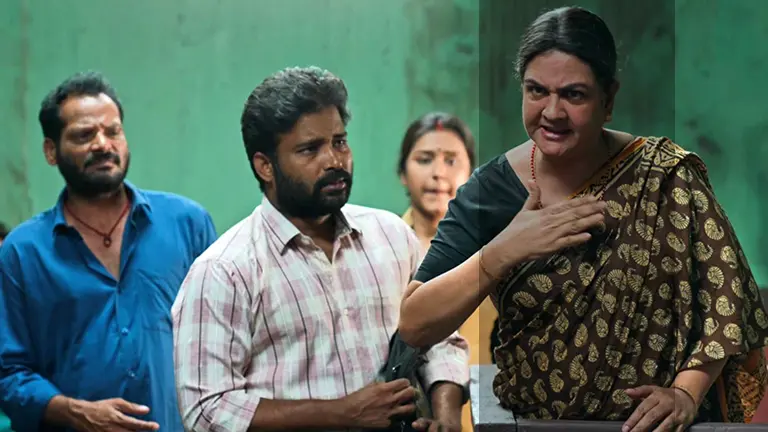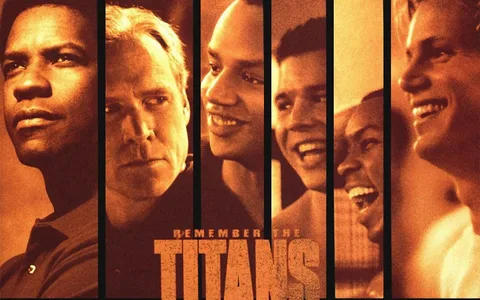Discover how the film’s non-linear storytelling affects its impact and why the whole may not be as captivating as its individual elements.
At a certain juncture in the movie, we witness Urvashi’s J Baby, the main character, watching Baby’s Day Out (1994) with her grandchildren. The movie’s tagline also has a nod to this Patrick Read Johnson-directed film. This particular scene subtly conveys two pivotal aspects that the entire film intricately (and sometimes exhaustively) delves into.
Let’s draw some parallels between the ‘infants’ in these two films. Well, in the Urvashi film, there is no ransom threat. Therefore, their motives for venturing out are dissimilar. Nevertheless, as a character exploration, they exist in their own realms, venturing and wandering around the cities as they please. Unbeknownst to themselves, they inadvertently cause quite a bit of chaos, and the filmmakers — both Johnson and Suresh Mari — exploit this for comedic moments. However, it’s crucial to note the differing perspectives the world holds toward them both. Indeed, society often views a child as innocent and an elderly person as ignorant.
The film emphasizes how the elderly deserve as much attention as an infant, especially after spending their lives laboring for their children. In this story, Baby marries at 13 and has five children — Shankar (Dinesh), Sekhar (Lollu Sabha Maaran), Selvi, Sharmila, and Selvam. Her husband, who we learn is deceased, remains unseen throughout. From the doodles in the opening credits, we witness Urvashi solely caring for the children. But when roles are reversed, are her children prepared to switch roles?
Before delving into the film, let’s revisit its second significant reference to Baby’s Day Out. While watching the movie, Baby tells her grandchildren that the baby in the film-within-the-film is actually her. Initially, you may dismiss this as one of her other delusional claims, akin to how she claims Indira Gandhi or Jayalalitha as her best friends. However, the connection strikes home later when we see someone explain to Sankar and Selvi that a human life is akin to a circle, where everyone eventually reverts to being a child. This forms the central theme of J Baby, which is inspired by a true event. Director Suresh delves into this theme through the lens of a dysfunctional family.
The fact that J Baby is based on a real incident is both a blessing and a curse. In 2013, an elderly woman accidentally found herself in Kolkata, prompting her two sons to search the streets for her. Drawing heavily from this incident, the film weaves a poignant emotional narrative. It takes a non-linear approach to narrate this, starting with the police informing Sankar and Shekar of their missing mother’s discovery in Kolkata. While this maintains the suspense, the technique can also prove quite distracting; it takes time to even discern who is who in the film. For instance, the film delves into the lives of Baby’s five children in detail only in the second half. Hence, besides Sankar and Shekar, the others remain unfamiliar, leading you to spend much of the film counting the members in the frame, trying to grasp their relationships.
This also affects the storytelling; the sum of what we witness isn’t as compelling and impactful as its individual components. For instance, we only get a glimpse of who Urvashi truly is in the second half. Yet the first half abounds with laugh-out-loud moments featuring the brothers (Dinesh and Maaran) compelled to stick together in the search for their mother. You can sense the effort put into crafting their dialogues — like when Maaran breaks down, questioning why his brother wouldn’t support him even in front of others. However, placing such a pivotal conversation right after an emotionally charged moment dampens its intended impact.
Similarly, when the film takes a melodramatic turn, you seamlessly immerse yourself in it, thanks to the heartrending performances, especially by Urvashi. After laughing for over an hour at the banter between the brothers and Urvashi’s mischievous acts — such as offering a gold ring to a stranger or causing a commotion that lands her children in trouble — a single line from her — “Na enna panrenu enake therila da” (I don’t know what I am doing) — is enough to move you to tears. This leads to a thought — would this shift from comedy to melodrama be as impactful without Urvashi’s presence?
It is her performance that draws you into this world when the writing struggles to delve beneath the surface. For example, a distraught Baby leaves her family for good. Interestingly, not a single soul bothers to look for her during this time. Yet suddenly, after five days, they are ready to journey to Kolkata to bring her back home. This discrepancy in character arcs is jarring. Thus, when tears flow or are on the verge of flowing, it’s due to the impact of the performances rather than the writing.
Suddenly, you’re inundated with one emotional moment after another. The film neither prepares you for this nor allows the moments to linger for you to absorb them. Just like that, after the emotional rollercoaster, we return to a lighter mood. Even as the film raises pertinent questions, offering a poignant portrayal of pain and neglect among the elderly, you’re weighed down by the multitude of emotions the film wants to evoke. So a scene might be humorous or heartbreaking in the moment, but by the film’s end, a piece of this emotional puzzle seems missing.



